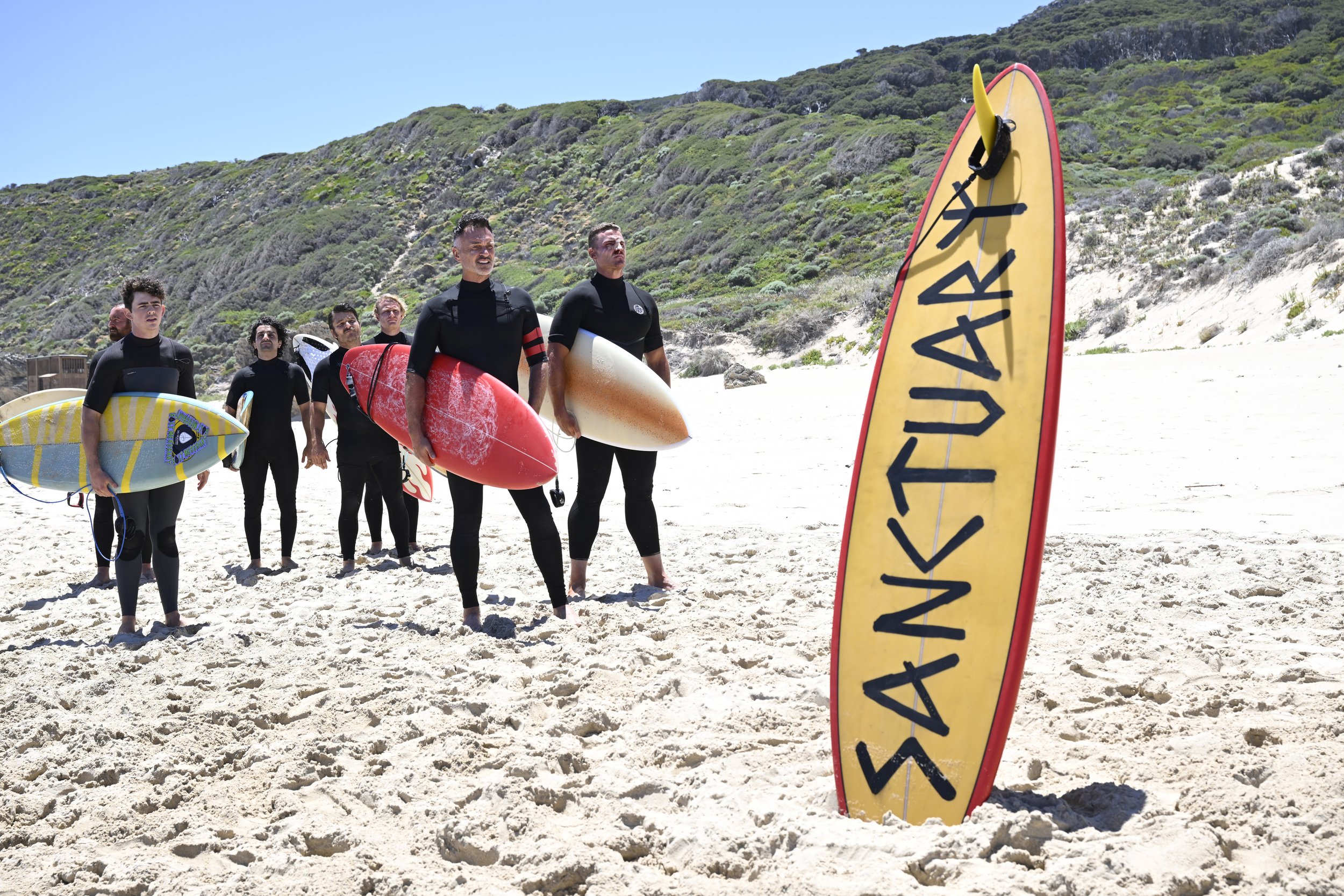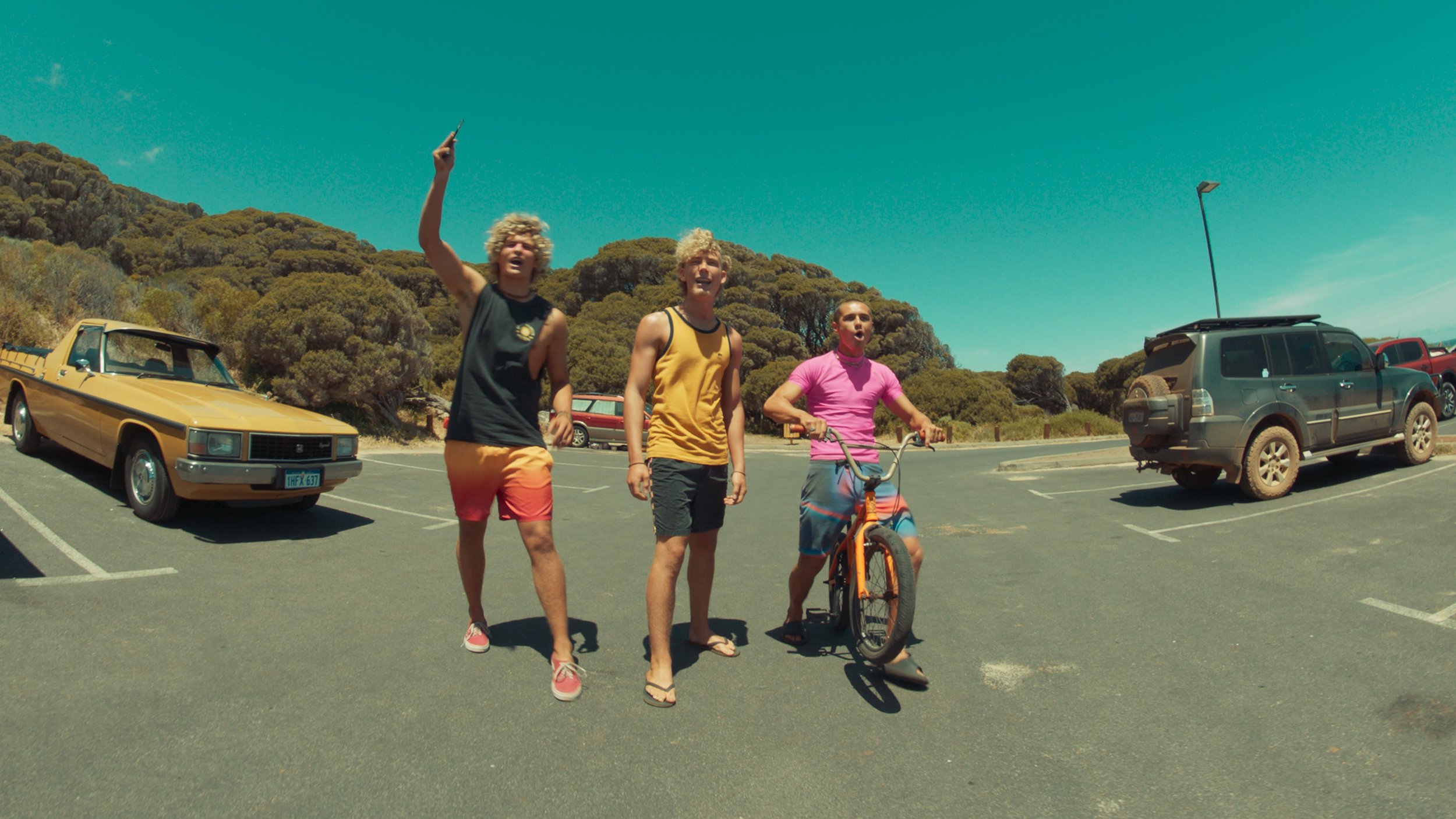Lorcan Finnegan On New Film, ‘The Surfer’
Okay so, it’s a movie titled The Surfer, set in Australia, where Nicolas Cage plays the protagonist, and it was directed by an Irish director?
These were my first thoughts when I heard about director Lorcan Finnegan’s latest film The Surfer, a psychological thriller that really doesn’t have much to do about surfing at all. The film a commentary on the fragile masculinity within surf localism, within Australia, while also using the surf as a metaphor. You see Nicolas Cage pushed to the brink of insanity on the shores of Yallingup, a town 256 kilometres south of Perth, the world's most isolated city. After premiering at the 77th Cannes Film Festival last year, the film is about to have its theatrical release in Australia on May 15 before releasing on Stan on June 15.
Prior to the Australian release we caught up with Lorcan Finnegan for a short chat about the film.
Congratulations on the release of The Surfer, how does it feel that it’s about to be seen by the public after its film festival run?
It’s always interesting to see how films are perceived by audiences in different territories. People always have a preconceived idea of what they are going to see from a trailer, poster or title and this film probably isn’t that. It has been going down pretty well around the world so far and I am really excited to see how it goes down in Australia next week.
Yeah, how are you feeling about the Australian release? The film is set in Australia and is a commentary of a sector of Australian culture.
Yeah, that’s it. It was mostly made by Australians as well, it was only the writer [Thomas Martin], the cinematographer [Radek Ładczuk], Nicolas Cage and I who aren’t Australian on the film. All our supporting cast, crew, editing department, and composer François Tétaz, who did a brilliant job with the music in the film, are Australian. To me this film is more of a cultural collaboration, which is what it always is when you do a co-production with another county. I’ve done a bunch of them with a bunch of countries around the world and this one is really Australian.
So, the movie is quite a crazy concoction of things, a psychological thriller, set in Australia, loosely based around surfing being a commentary on surf localism. How did the concept come up for the film and grow into what it became?
The writer Thomas Martin was working on a book adaptation in Sydney, while he was there he was out surfing a good bit. One day he was getting out of his wetsuit and into his clothes, when he saw two guys who had just taken off their wetsuits and put on suits, quite corporate looking guys. Suddenly a fight broke out between the two guys and they started really beating the shit out of each other on the sand. Blood, teeth missing, and everything. He was really shocked by it, he thought it was weird that these guys who obviously have public facing jobs and clients also are these animalistic, tribalistic guys when it comes to the beach. That set him off researching localism and this sort of phenomenon around hyper masculinity and masculinity in crisis, these influencers like Joe Rogan, Jordan Peterson, and Tim Morrison. That was the catalyst, and he went and wrote an outline for the story and he sent it to me and I thought it sounded great. Both Tom and I have a love for Australian new wave cinema so we thought this would be perfect as a film set in Australia, there are amazing locations, surf culture and the story was taking place over Christmas so we can have this Christmas beach movie in Australia which is a perfect setting.
How was it filming in Western Australia?
It was great, it’s an amazing place. I scouted all up and down the West Coast and we settled on this town, Yallingup near Margaret River, it was really nice. I was sort of hoping there would be some localism, but everyone was really friendly. We got there in winter really, so we were prepping the film for a few months before shooting and it was quite quiet and stormy. It gradually got warmer, and more people started appearing out of the woodwork.
It looks so nice out there. Also going back to the fact the film is an outsider’s commentary of Australian culture, in a similar way to Wake in Fright. What was your experience with and thoughts on Australian culture prior to the film?
Well, I've spent a bit of time in Australia before, I’ve shot some TV commercials there before, shown previous films at the Melbourne Film Festival, been to weddings, and have friends who live in Australia. Also growing up in Ireland every one of my generation would watch Home and Away and Neighbours so there was always this familiarity of Australia. To me the film isn’t a cultural representation of Australia as a whole, it is a very specific group of people, because even in the film, we don’t ever really explore any characters other than those who control the beach. Even still, the only one we really get to know is Julian Mcmahon's character [Scully] because he has all these other guys under his spell as a cult leader almost. It was really interesting to explore that, but there was also an element of poking fun at that idea of masculinity in crisis, they’re almost childish in their behaviour, it’s like having a treehouse and not letting one of your friends play in it but these guys are playing with a tiki hut. It is a really specific subsection of culture, not just Australian culture but culture in general.
Yeah totally, it is such an interesting subsection of culture too. The film isn’t really about surfing but it is a big part of the film and the film’s title. Can we dive into the role of surfing in the film?
There is the metaphor of the wave being life, which is the opening line in the film, ‘You either surf or you get wiped out.’ The sea, the waves, the rhythm of the waves building up to something that gets violent and heavy and smashes down. We are working in parallels with the narrative of what is happening with Cage’s character [The Surfer], he is getting pushed and pushed until he reaches this crest right before he fights Alexander Bertrand's character [Pitbull] where he smashes down. We talk about the opening which is mentioning a short, sharp, shock of violence on the shore, which is also related to his childhood, what happened with his father and what’s going to happen to the end of the film and how it’s all connected. The sea and surf breaks are tied into the structure of the story and the metaphor, and to be able to either ride those waves or let them consume you is also baked into it. That was also a part of the story and how it’s connected to surfing. Also it’s beautiful to look at and he has this thing that he is not allowed to do, you have this juxtaposition of this dry, harsh, carpark where he is dehydrated, sunburnt but he is looking out at this crystalline, turquoise water that looks cool and refreshing and all he wants to do is go out there and go surfing but he can’t. That’s another one of the things where we had the push and pull elements together.
What’s your experience surfing?
I’ve surfed a bunch of times but I’m not very good. I thought I was going to have lots of time in Yallingup to surf and improve, being there for four months, but unfortunately making a film is super time consuming, so even on the weekends me, the cinematographer and the first AD would have to plan the week ahead. I did go out a little bit but not very often and didn’t improve massively.
How did it come to cast Nicolas Cage as the protagonist?
Once we had the story ready, I remember reading through it and I had a list of actors who I thought would be great for the role and Cage was up top. Picturing him in every scene I thought he would be great if he would do it. We sent him the script and we got very lucky that one he reacted to the title, The Surfer because he grew up in California and knows about surf culture and thought it was intriguing. Two he had seen a film I had made a few years ago called Vivarium which he liked and was like that’s the guy who made that film, I’ll check it out. He read it and he really responded to the material, he loved the writing and the character. He knew it was going to be challenging being put through the ringer like that. When I got on the phone with him, we got along really well, we like the same films and have a similar sense of humour and he loved the idea of going off to Australia to make this film.
Nicolas Cage has said he doesn’t think a day goes by where he isn’t mistaken for Nick Cave. Do you think him acting in this movie set in Australia is going to cause even more confusion between the two?
I saw that, probably ‘Have you seen the new Nick Cave film?’ [laughs]. I heard so many people say ‘Cave’ instead of ‘Cage’ even during production, I think it’s just one of those things, they don’t look anything alike, but they are both pretty cool guys.




